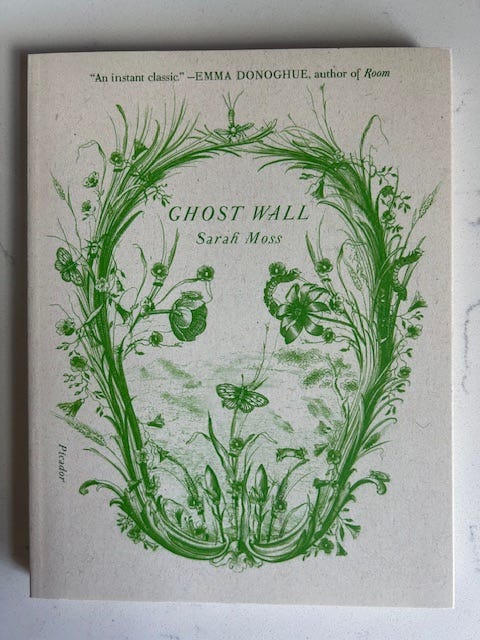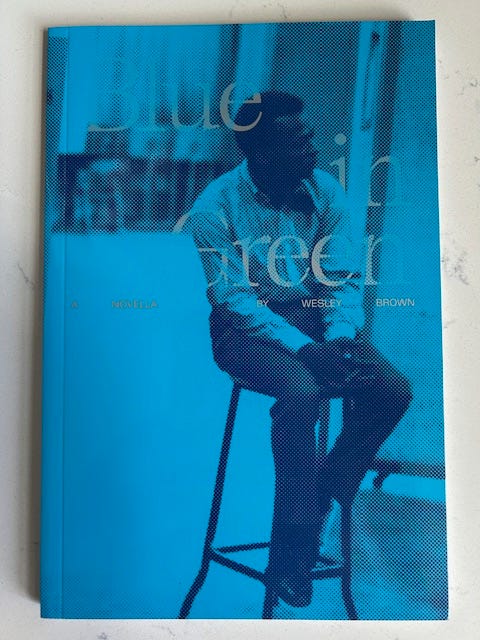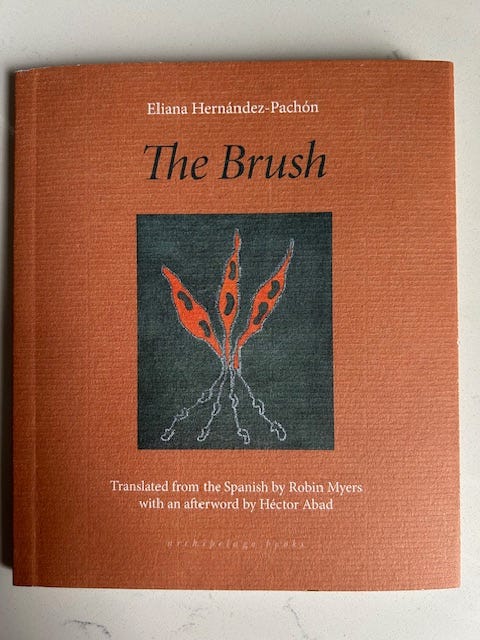Three More Books You Can Finish In a Day or Two
'Ghost Wall' by Sarah Moss, 'Blue in Green' by Wesley Brown and 'The Brush' by Eliana Hernández-Pachón—Review #257

Donna and I hope you’re enjoying Memorial Day Weekend and taking some time for rest, reflection and, of course, reading. As you all know, this weekend is the unofficial start of summer, but here at Books on GIF it’s also the official start of what’s becoming an annual tradition—short-book summer! Between now and Labor Day, I’m looking to take my foot off the gas a bit and read books that won’t require every free moment, day off, subway ride and lunch break to get through. (Now, of course, short-book summer is not for everyone. Some folks prefer big books on their beach blankets, and that’s totally OK. Read what you want!) You may remember last year around this time we featured three books you can finish in a day or two, and your enthusiastic response had us like:
If you’re looking for some quick reads these next few months, here are three more books to consider.
‘Ghost Wall’ by Sarah Moss

Sylvie’s overbearing and miserable father hates modern life in the late 20th century and is obsessed with ancient England. He takes Sylvie, 17, on camping trips and walks in the northern English countryside to explore the lands where prehistoric people lived and to forage for the foods they used to eat. He also takes her to visit museums to see the artifacts and bog-preserved remains of their primeval predecessors. Life was better, he fervently believes, back in the really old days before television, convenience stores and indoor plumbing, and connecting to this past—even trying to relive it—is the only authentic existence. One summer, Sylvie’s father forces her and her mother to live with him in a hut in the wilderness where they can recreate life in the Iron Age, down to the period-appropriate tunics and moccasins. He’s also linked up somehow with a college professor, who joins the family camp with some of his students. The group spends days digging up roots, collecting drinking water, gathering mussels on the beach, hunting rabbits and weaving baskets as if they all have traveled back in time. But this is not a fun family getaway with a historical twist. The setup feels sinister and had me saying:
During Sylvie’s time in the ‘Iron Age,’ she is challenged not only by a life deprived of many modern conveniences and by her father’s abusive obsession, but also by new feelings and desires awakened within her. Her journey is harrowing, and I’ll say no more about it because:

‘Ghost Wall’ by Sarah Moss is a chilling exploration of how history and nostalgia can become toxic. It shows that learning about the past doesn’t necessarily lead to wisdom, insight and empathy—it can just as easily become corrupt when elements are stacked to reinforce one’s ignorance and self-loathing, like:
I first heard about ‘Ghost Wall’ when
and mentioned it earlier this year in one of our discussion threads. The title stuck with me until I saw the book while I was traveling for work. I read the back-cover blurb and a few opening paragraphs and knew I had to pick it up. ‘Ghost Wall’ is a riveting read. Moss writes tightly—even quote marks are cast aside (they didn’t exist in the Iron Age, anyway)—and the story moves quickly. I recommend it.An opening excerpt:
They bring her out. Not blindfolded, but eyes widened to the last sky, the last light. The last cold bites her fingers and her face, the stones bruise her bare feet. There will be more stones, before the end.
She stumbles. They hold her up. No need to be rough, everyone knows what is coming. From deep inside her body, from the cord in her spine and the wide blood-ways under the ribs, from the emptiness of her womb and the rising of her chest, she shakes. A body in fear. They lead the fearful body over the turf and along the track, her bare feet numb to most of the pain of rock and sharp rushes. Chanting rises, the drums sound slow, unsyncopated with the last panic of her heart. Others follow, wrapped against the cold, dark figures processing into the dusk.
My rating:

‘Ghost Wall’ by Sarah Moss was originally published in 2018 by Granta Books. It was published by Picador in 2019. 130 pages. $15.81 at Bookshop.org.
‘Blue in Green’ by Wesley Brown

On Aug. 25, 1959, Miles Davis was beaten by a New York City police officer outside the Birdland nightclub, where he had been performing. Wesley Brown uses the incident as the starting point for ‘Blue in Green,’ a novella that imagines and explores the jazz legend’s complex interior life and relationships during the prime of his fame. ‘Kind of Blue,’ his most famous album, has just come out; ‘Sketches of Spain’ is in progress; and he’s collaborating with a who’s who of jazz royalty—from Charlie Parker to Cannonball Adderley to John Coltrane—who all cameo, like:

After the police incident, Davis and his wife, dancer Frances Taylor, head home. But Davis, shaken and upset, leaves Taylor at their apartment and drives his Ferrari around Manhattan, reflecting on landmarks from his career: jazz clubs like the Royal Roost, restaurants where he’s discussed the arrangements for ‘Sketches of Spain’ with Gil Evans and the Plaza Hotel where he had an important conversation with Billie Holiday, among others. Meanwhile, Taylor is contemplating her own journey, from youthful dancing lessons to a role in ‘West Side Story’ to fraught encounters with Lena Horne and Eartha Kitt. She also considers her relationship with Davis—his temper, jealousy and physical abuse scare her. Although ‘Blue in Green’ is short, it contains a meditation on art, music, fame and race. And though it doesn’t flinch from showing Davis behaving monstrously, it’s also an ode to a defining moment in jazz history. I almost could hear the music, including the song that lends the book its name:
I love the music of Miles Davis, so when I saw the cover of Brown’s novella, I had to pick it up. I admire the ambition of the story, and I enjoyed reading it, but there were points where I struggled. Scenes felt rushed at times, and several of the cameos felt forced and cramped. But maybe that was the point, to create a sense of being in a crowded nightclub. If you’re into jazz and music history, ‘Blue in Green’ is worth checking out.
An opening excerpt:
‘Muthafucka,’ Miles said under his breath, more in frustration than anger. While smoking a cigarette outside Birdland—after he’d escorted a woman to a cab at the curb—a cop told him to move along.
‘I’m working,’ he said, pointing to the marquee. A smirk curved the cop’s mouth.
‘Oh, so now they got you showing people in and out the club instead of that midget in a uniform who usually does it.’
Like a boxer in the opening round, Miles felt heat rising to his forehead. The words stung for a second.
‘You got a problem with what I do inside or what I just got through doing out here?’
‘It doesn’t matter to me one way or the other. But if it did, I’d do something about it,’ the cop said.
‘If it’s about the woman I put in the cab, I guess movies are the only thing you like to see in black and white.’
The cop grimaced. He stepped closer, his hands tightening around his nightstick.
My rating:
‘Blue in Green’ by Wesley Brown was published by Blank Forms Editions in 2022 and 2024. 65 pages. $13.95 at Bookshop.org.
‘The Brush’ by Eliana Hernández-Pachón

In 2000, residents of a Colombian village called El Salado were attacked by right-wing paramilitary forces. ‘The Brush’ by Eliana Hernández-Pachón reckons with that real-life event through a searing and beautiful narrative poem that follows husband-and-wife characters Pablo and Ester as they navigate the calamity. We see their everyday lives—listening to the radio, eating clementines on the porch, feeding the cat off a dinner plate—before an ominous leaflet appears. Pablo sets out to bury what household treasures they have in a secret place out in the underbrush. Ester tangles with the brush, too, as if enduring a terrible dream of lost souls and an unforgiving landscape. The brush itself bears witness to the horror, accompanied by excerpts from official accounts. I don’t remember where I first heard about ‘The Brush,’ and I didn’t realize it was a poem until after I picked it up. Somehow, I have never featured a work of poetry before now, and I was anxious that I wouldn’t know how to talk about it properly. But I got over that and was like:

‘The Brush’ is a powerful and important story about a brutal moment in history that’s told with beauty, grace and force. Hernández-Pachón’s poem speaks to the essential and human dimensions of a terrible event, and it helps the reader feel and understand the past on an emotional level (something the father in ‘Ghost Wall’ never could do). It also reminded me that I need to add more poetry to my newsletter mix. ‘The Brush’ is as intense as it is brief—it took me less than a subway commute into Manhattan to finish—and if you’re up for it, I recommend it.
An opening excerpt:
Pablo has
sparse hair on his head
and bags under his eyes like almonds:
he always looks exhausted.His skin is leather-tough,
his hands clumsy, thickened from working the land,
two marks in the middle of his forehead,
two red furrows form there,
when he’s angry, ever since he was a boy,
and now,
when he watches the news at seven,
his eyelids drooping, he says to no one:
this goddamned country
we’re doomed this time
and feels a flare of heat in his brow.
My rating:

‘The Brush’ by Eliana Hernández-Pachón was originally published in Colombia by Laguna Libros. It was translated from the Spanish by Robin Myers and published by Archipelago Books in 2024. 60 pages. $15.81 at Bookshop.org.
What’s next:
Books on GIF does not solicit or accept review copies. We feature books we purchase at independent bookstores around New York City and on our travels, or were borrowed electronically from the Brooklyn Public Library.
Before you go:
ICYMI: Review #256
Read this: Did you see the AI-driven fiasco with the Chicago Sun-Times summer reading list? Yikes!
Read this, too: For more quick weekend reading,
just recirculated a few seasonal pieces called ‘Our All-Time Favorite Summer Reads to Celebrate the Season’.If you enjoyed this review:
Thanks for reading, and thanks especially to Donna for editing this newsletter!
Until next time,

MPV












quote marks didn’t exist in the Iron Age: facts
I am such a contrarian. Over the summer, I try to clear bigger books off my shelf. I just started The Mirror and the Light by Hilary Mantel, the third in the Thomas Cromwell trilogy. And then I will finish The Neapolitan Quartet. I may read some smaller books in between, but they will be light and fluffy. Enjoy the rest of the weekend, hi to Donna.